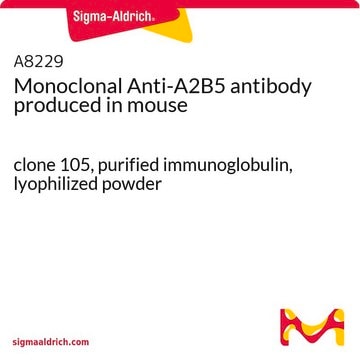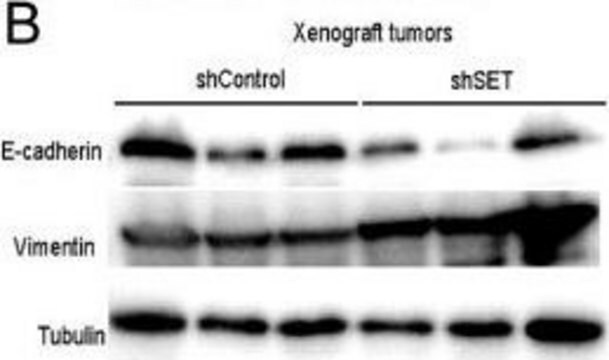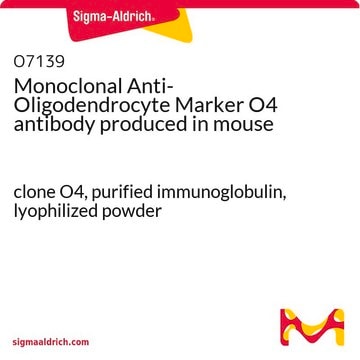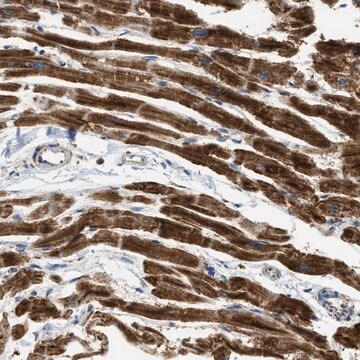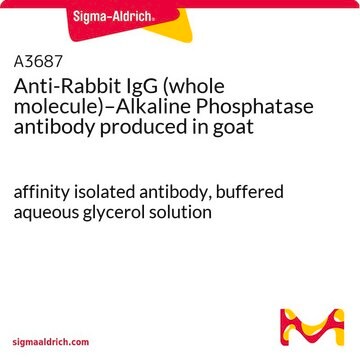MAB312R
Anti-A2B5 Antibody, clone A2B5-105
clone A2B5-105, Chemicon®, from mouse
Synonym(s):
Neuron Cell Surface Antigen
About This Item
Recommended Products
biological source
mouse
Quality Level
antibody form
saturated ammonium sulfate (SAS) precipitated
antibody product type
primary antibodies
clone
A2B5-105, monoclonal
species reactivity (predicted by homology)
mammals
manufacturer/tradename
Chemicon®
technique(s)
flow cytometry: suitable
immunocytochemistry: suitable
immunofluorescence: suitable
immunohistochemistry: suitable
isotype
IgM
shipped in
dry ice
target post-translational modification
unmodified
General description
Specificity
Neurofibrillary tangles in the post-mortem brain tissue of patients with a confirmed diagnosis of Alzheimer′s disease (Majocha et al., 1989)
Neurons of chicken retina, brain, spinal cord, and dorsal root ganglia (Schnitzer & Schachner, 1982; Eisenbarth et al., 1979).
Rat striatal nerve terminals [synaptosomes (Wolf & Kapatos, 1989)].
Neuroblastoma cells in man (Oppedal et al., 1989; Coakham et al., 1985).
Rat insulinoma cells and pancreatic islets cells (Shimizu et al., 1983; Bartholomeusz et al., 1989).
Human and rat thymic epithelial cells (Haynes et al., 1988).
Cells involved in gliogenesis (Bottenstein et al., 1988; Suzumura & Slerberg, 1989).
Oligodendrocytes and astrocytes, type II (Dubois-Dalcq et al., 1990).
Immunogen
Application
Complement-mediated cytotoxicity (Eisenbarth et al., 1979)
Flow cytometry: live cells {Maric, D. et al. (2000) Cerebral Cortex 10:729-747}.
Optimal working dilutions must be determined by end user.
Neuroscience
Neuronal & Glial Markers
Physical form
Storage and Stability
Analysis Note
Type II astrocytes, human neural progenitors
Other Notes
Legal Information
Disclaimer
Not finding the right product?
Try our Product Selector Tool.
Storage Class Code
12 - Non Combustible Liquids
WGK
WGK 2
Flash Point(F)
Not applicable
Flash Point(C)
Not applicable
Certificates of Analysis (COA)
Search for Certificates of Analysis (COA) by entering the products Lot/Batch Number. Lot and Batch Numbers can be found on a product’s label following the words ‘Lot’ or ‘Batch’.
Already Own This Product?
Find documentation for the products that you have recently purchased in the Document Library.
Our team of scientists has experience in all areas of research including Life Science, Material Science, Chemical Synthesis, Chromatography, Analytical and many others.
Contact Technical Service
